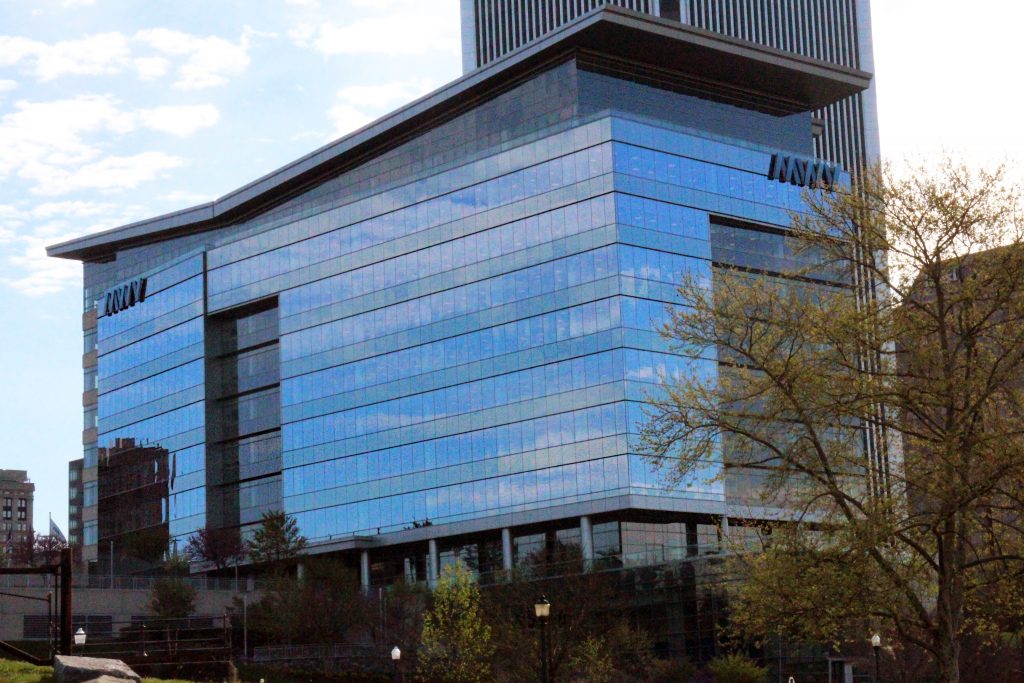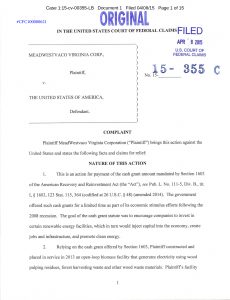A Richmond Fortune 500 is taking on Uncle Sam.
Downtown-based packaging giant MeadWestvaco is suing the federal government for nearly $47 million in economic stimulus funding that the company says it is owed for a clean energy facility it built at its paper mill in Covington, Virginia.
The suit, filed this month in federal claims court, contends the U.S. Treasury violated terms of a recession-era program that offered companies that invested in renewable energy facilities a 30 percent reimbursement on construction costs. The program was part of the American Recovery and Reinvestment Act.
The biomass facility MWV built in Covington cost $291 million, according to the suit; $286.2 million of that was considered qualified costs through the federal program. Construction began in 2011, and the facility was completed and operational in 2013.
The company then applied for a 30 percent reimbursement of the qualified costs, or $85.9 million. The government did reimburse MWV in July 2014; but it was for less than half that amount: $38.9 million.
The lawsuit states that the government’s justification for cutting half of the expected reimbursement was related to a measurement of the facility’s extraction of steam. It states that the government determined the facility’s energy production was less than half the value of energy produced by comparable facilities.
MWV’s suit disagrees with that assessment.
“The government’s determination is so erroneous and uninformed that it is entitled to no deference and should be discarded completely,” the lawsuit states.
The suit notes that the facility, which generates electricity using wood pulping residues, forest harvesting waste and other wood waste materials, generated 489,277 megawatt hours of electricity in its first year of operation. Electricity produced there is sold to Dominion Power.
The lawsuit seeks the award of the remainder of the reimbursement – $46.975 million – as well as attorney’s fees and court costs.
A response to the suit from the government had not been filed as of Friday. A message left Thursday with the Department of the Treasury’s press office was not returned.
Pamela Marple, with Washington, D.C.-based law firm Greenberg Traurig, is one of three attorneys representing MWV in the case. She did not return a call seeking comment.
Tucker McNeil, spokesman for MWV, said the company would let the lawsuit speak for itself.
MWV, one of Richmond’s largest publicly traded companies, is on the verge of a merger with fellow packaging company Rock-Tenn Co. The January announcement of the deal sparked response from multiple law firms interested in pursuing potential class-action cases.
A Richmond Fortune 500 is taking on Uncle Sam.
Downtown-based packaging giant MeadWestvaco is suing the federal government for nearly $47 million in economic stimulus funding that the company says it is owed for a clean energy facility it built at its paper mill in Covington, Virginia.
The suit, filed this month in federal claims court, contends the U.S. Treasury violated terms of a recession-era program that offered companies that invested in renewable energy facilities a 30 percent reimbursement on construction costs. The program was part of the American Recovery and Reinvestment Act.
The biomass facility MWV built in Covington cost $291 million, according to the suit; $286.2 million of that was considered qualified costs through the federal program. Construction began in 2011, and the facility was completed and operational in 2013.
The company then applied for a 30 percent reimbursement of the qualified costs, or $85.9 million. The government did reimburse MWV in July 2014; but it was for less than half that amount: $38.9 million.
The lawsuit states that the government’s justification for cutting half of the expected reimbursement was related to a measurement of the facility’s extraction of steam. It states that the government determined the facility’s energy production was less than half the value of energy produced by comparable facilities.
MWV’s suit disagrees with that assessment.
“The government’s determination is so erroneous and uninformed that it is entitled to no deference and should be discarded completely,” the lawsuit states.
The suit notes that the facility, which generates electricity using wood pulping residues, forest harvesting waste and other wood waste materials, generated 489,277 megawatt hours of electricity in its first year of operation. Electricity produced there is sold to Dominion Power.
The lawsuit seeks the award of the remainder of the reimbursement – $46.975 million – as well as attorney’s fees and court costs.
A response to the suit from the government had not been filed as of Friday. A message left Thursday with the Department of the Treasury’s press office was not returned.
Pamela Marple, with Washington, D.C.-based law firm Greenberg Traurig, is one of three attorneys representing MWV in the case. She did not return a call seeking comment.
Tucker McNeil, spokesman for MWV, said the company would let the lawsuit speak for itself.
MWV, one of Richmond’s largest publicly traded companies, is on the verge of a merger with fellow packaging company Rock-Tenn Co. The January announcement of the deal sparked response from multiple law firms interested in pursuing potential class-action cases.





Corporate welfare at its finest
Some might say big, flatulent government reneging on legislative consensus.